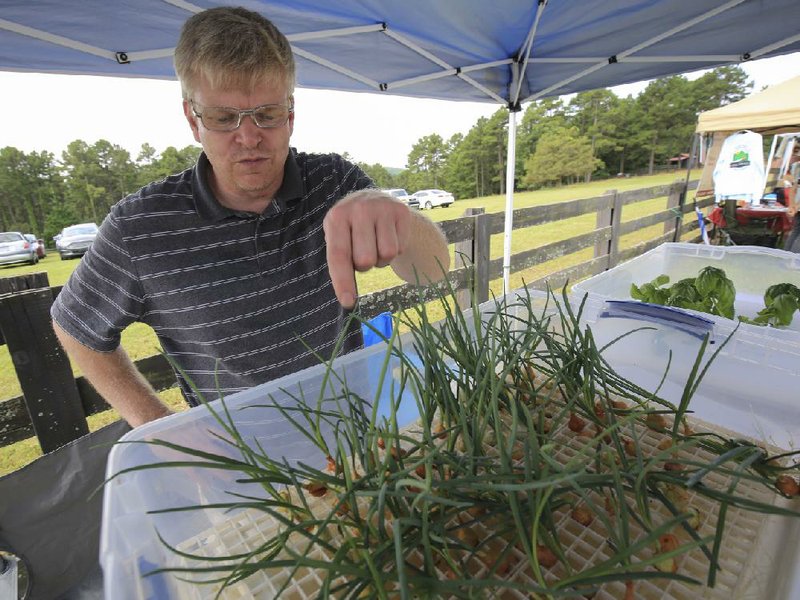With a growing local brewery scene, and an emphasis on using local ingredients, some farmers are trying their hand at growing hops.
Though hops grow best in climates along the 47th parallel, like Oregon or Wisconsin, Arkansas growers are getting creative.
Michael Vass of Fresh Right Now Farms decided he didn't need to live in the 47th parallel. All he had to do was replicate the climate.
"I like the challenge of anything that people think can only grow in one part of the world," Vass said. "I like to prove you can grow it anywhere."
Vass grows his plants hydroponically -- without soil. Instead the plants are suspended in water or air. Vass keeps all his plants indoors, in a climate-controlled room under carefully tuned plant lights and misters.
Vass has grown lettuce, mint, basil and other herbs that he sells to local restaurants. He's been experimenting with coffee for the past three years, and he started growing hops last year.
Though hydroponic hops would cost 25 percent more than traditionally grown hops, Vass said he can provide added value by changing the flavor of the hops naturally.
"We can add notes of basil or mint to the crop by flushing different nutrients through the water before harvest," Vass said while showing off his chocolate-flavored mint plants at gardening expert P. Allen Smith's Farm2Home event recently.
Vass said this could eliminate the need for brewers to buy other ingredients, saving them money.
Vass has reached out to local breweries about buying his hops, which he hopes to have ready by next spring. He wouldn't name the interested breweries.
Matt Foster of Flyway Brewing Co. in Little Rock said he tried to source local hops when he first opened.
"In 2013 and 2014 we brewed one batch of beer with locally grown hops, but due to our size now we haven't been able to replicate that again," Foster said.
Foster said suppliers in Arkansas couldn't keep up with the demand from local breweries.
"There's not a huge market for local hops here outside of home brewers and hobbyists," Foster said. "It really is a bummer for me to say that because we'd love to use local hops."
James Spencer, a writer for the Beer and Wine Journal, tried his hand at growing hops at his home in Prairie Grove -- a venture that was short-lived. Spencer used the hops for his home brews.
"I have given up on my homegrown hops," Spencer said. "It was fun to watch them grow, and they're pretty when they're producing cones, but the actual product was inferior to what you'd purchase commercially."
Spencer said he doesn't know anyone in Arkansas producing hops on a large scale.
Saddlebock Brewery in Springdale has a half-acre of hops, but that's nowhere near enough for it to make beer year-round.
The half-acre produces 12 to 15 pounds of hops per harvest. A 900-gallon batch of their India Pale Ale requires more than 30 pounds of hops.
Blaine Leslie of Saddlebock Brewery said the hops field is more aesthetic than functional.
"We have it because not many people have seen a hops plant before, and we give it out to home brewers sometimes," Leslie said.
Leslie said the brewery would source local if the supply could keep up with their demand.
Saddlebock Brewery gets shipments of 300 to 400 pounds of hops every few months through a grain supplier.
Local growers would also have to provide the varieties Saddlebock Brewery uses, an impossible task considering many varieties are patent-protected.
"The best we could hope for is a local supplier could produce enough for us to make a niche type of brew for a season," Leslie said.
SundayMonday Business on 06/26/2016

